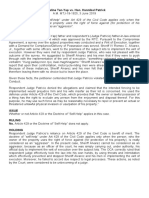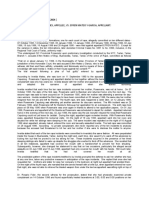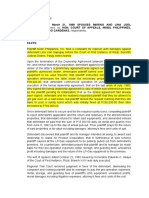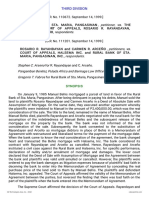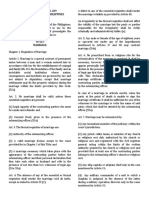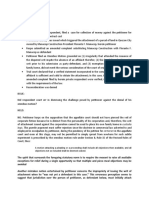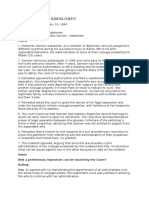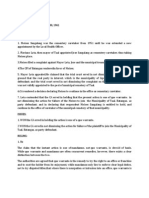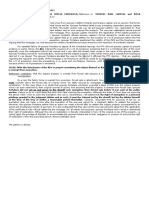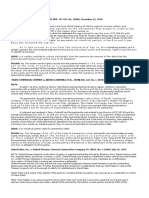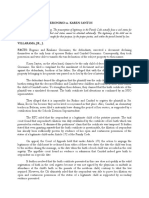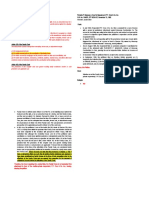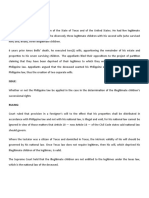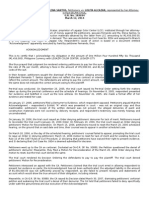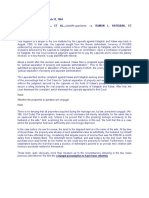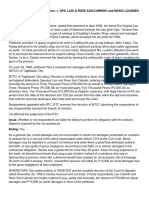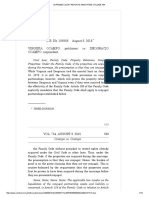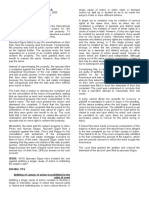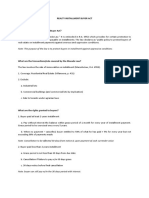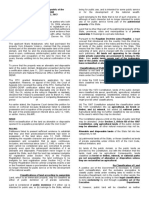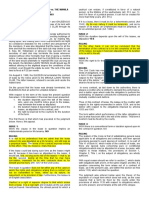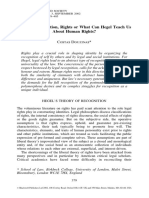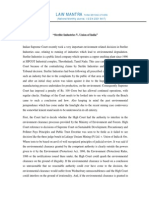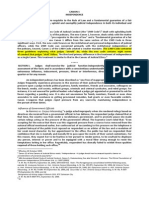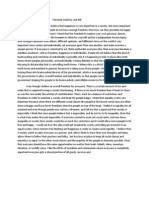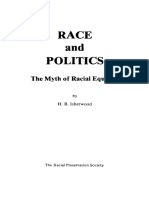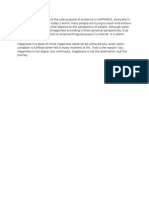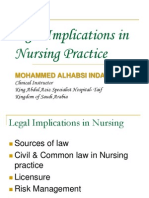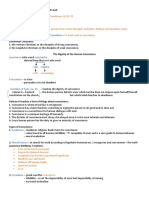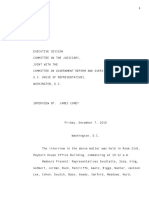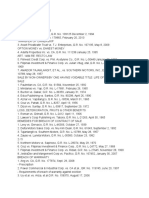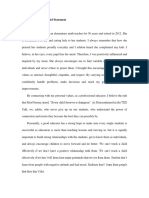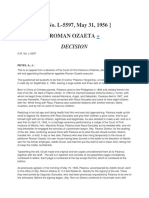0 ratings0% found this document useful (0 votes)
84 viewsOcampo Vs Ocampo GR 198908 FACTS: On September 10, 1990, Petitioner Virginia Sy
Ocampo Vs Ocampo GR 198908 FACTS: On September 10, 1990, Petitioner Virginia Sy
Uploaded by
Shimi Fortuna1) Virginia filed for annulment of her marriage to Deogracio due to psychological incapacity, which was granted. They were then ordered to partition their properties.
2) The court found that since Virginia did not sufficiently prove that the properties were solely acquired through her efforts, the properties should be split equally between the parties under Article 147 of the Family Code.
3) While Virginia claimed some properties were from funds provided by her mother, the court found insufficient evidence to support depriving Deogracio of his share based on Virginia's allegations. The certificates of title and tax declarations alone were not enough to overcome the presumption that properties acquired during marriage are conjugal.
Copyright:
© All Rights Reserved
Available Formats
Download as DOCX, PDF, TXT or read online from Scribd
Ocampo Vs Ocampo GR 198908 FACTS: On September 10, 1990, Petitioner Virginia Sy
Ocampo Vs Ocampo GR 198908 FACTS: On September 10, 1990, Petitioner Virginia Sy
Uploaded by
Shimi Fortuna0 ratings0% found this document useful (0 votes)
84 views2 pages1) Virginia filed for annulment of her marriage to Deogracio due to psychological incapacity, which was granted. They were then ordered to partition their properties.
2) The court found that since Virginia did not sufficiently prove that the properties were solely acquired through her efforts, the properties should be split equally between the parties under Article 147 of the Family Code.
3) While Virginia claimed some properties were from funds provided by her mother, the court found insufficient evidence to support depriving Deogracio of his share based on Virginia's allegations. The certificates of title and tax declarations alone were not enough to overcome the presumption that properties acquired during marriage are conjugal.
Original Description:
Case Digest
Original Title
Ocampo vs Ocampo
Copyright
© © All Rights Reserved
Available Formats
DOCX, PDF, TXT or read online from Scribd
Share this document
Did you find this document useful?
Is this content inappropriate?
1) Virginia filed for annulment of her marriage to Deogracio due to psychological incapacity, which was granted. They were then ordered to partition their properties.
2) The court found that since Virginia did not sufficiently prove that the properties were solely acquired through her efforts, the properties should be split equally between the parties under Article 147 of the Family Code.
3) While Virginia claimed some properties were from funds provided by her mother, the court found insufficient evidence to support depriving Deogracio of his share based on Virginia's allegations. The certificates of title and tax declarations alone were not enough to overcome the presumption that properties acquired during marriage are conjugal.
Copyright:
© All Rights Reserved
Available Formats
Download as DOCX, PDF, TXT or read online from Scribd
Download as docx, pdf, or txt
0 ratings0% found this document useful (0 votes)
84 views2 pagesOcampo Vs Ocampo GR 198908 FACTS: On September 10, 1990, Petitioner Virginia Sy
Ocampo Vs Ocampo GR 198908 FACTS: On September 10, 1990, Petitioner Virginia Sy
Uploaded by
Shimi Fortuna1) Virginia filed for annulment of her marriage to Deogracio due to psychological incapacity, which was granted. They were then ordered to partition their properties.
2) The court found that since Virginia did not sufficiently prove that the properties were solely acquired through her efforts, the properties should be split equally between the parties under Article 147 of the Family Code.
3) While Virginia claimed some properties were from funds provided by her mother, the court found insufficient evidence to support depriving Deogracio of his share based on Virginia's allegations. The certificates of title and tax declarations alone were not enough to overcome the presumption that properties acquired during marriage are conjugal.
Copyright:
© All Rights Reserved
Available Formats
Download as DOCX, PDF, TXT or read online from Scribd
Download as docx, pdf, or txt
You are on page 1of 2
Ocampo vs Ocampo exclusively with each other as husband and wife; and
GR 198908 3.) their union is without the benefit of marriage or
their marriage is void as in the instant case. The term
FACTS: On September 10, 1990, petitioner Virginia Sy “capacitated” in the
Ocampo (Virginia) filed a Petition for Declaration of
Nullity of her Marriage with Deogracio Ocampo st
(Deogracio) before Regional Trial Court of Quezon 1 paragraph of the provision pertains to the legal
City, Branch 87, on the ground of psychological capacity of a party to contract marriage.
incapacity. The decision became final, since no party
appealed the judgment annulling the marriage. On Both trial and appellate courts correctly held that the
March 31, 1999, the trial court directed the parties to parties will share on equal shares considering that
submit a project of partition of their inventoried Virginia failed to prove that the properties were
properties, and if they failed to do so, a hearing will acquired solely on her effort. While it may be true
be held on the factual issues with regard to said that management of the business may have been
properties. Having failed to agree on a project of actively undertaken by Virginia, it cannot be gainsaid
partition of their conjugal properties, hearing ensued that petitioner was able to do so without the
where the parties adduced evidence in support of invaluable help of respondent-husband. Even a plain
their respective stand. On January 13, 2004, the trial housewife who stays all the time in the house and
court rendered the assailed Order stating that the takes care of the household while the husband
properties declared by the parties belong to each one indulges in lucrative and gainful activities is entitled
of them on a 50-50 sharing. to a share in the same proportion as the husband is,
to the property/ies acquired by the marriage. In the
ISSUE: Whether respondent should be deprived of his same breadth, respondent must be considered to be
share in the conjugal partnership of gains by reason of entitled to the same extent. Petitioner’s claim that
bad faith and psychological perversity. the seed money in the business was provided by her
mother and that, had it not been for that reason, the
RULING properties now subject of the controversy could not
have been acquired. That may be true but the Court
The property relations between Virginia and is not prone to believe so because of insufficient
Deogracio is the conjugal partnership of gains having evidence to prove such contention based on
been married in 1978 but Article 108 of the Family petitioner’s self-serving allegations. Attempts to
Code explicitly mandates that the Code shall apply to establish Deogracio as an irresponsible and an
conjugal partnership of gains established before the unfaithful husband, as well as a family man were
Family Code without prejudice to vested rights made but the testimonies adduced towards that end,
already acquired under the Civil Code or other laws. failed to fully convince the Court that respondent
should be punished by depriving him of his share of
the conjugal property because of his indiscretion.
The applicable law, however, in so far as the
liquidation of the conjugal partnership assets and
liability is concerned, is Article 129 in relation to The certificates of titles and tax declarations are not
Article 147 of the Family Code. Article 147 of the FC sufficient proof to overcome the presumption under
applies to union of parties who were legally Article 116 of the FC. All properties acquired by the
capacitated and not barred by any impediment to spouses during their marriage, regardless in whose
contract marriage, but whose marriage is name the properties are registered, are presumed
nonetheless, void, as in this case. conjugal unless proved otherwise. The presumption is
not rebutted by the mere fact that the certificate of
title or the tax declaration is in the name of one of the
This particular kind of co-ownership applies when a
spouses only. Article 116, FC expressly provides that
man and a woman, suffering no legal impediment to
the presumption remains even if the property is
marry each other, exclusively live together as
“registered in the name of one or both of the
husband and wife under a void marriage or without
spouses”. Accordingly, the partition of the former
the benefit of marriage. It is clear, therefore, that for
spouses’ properties shall be based on co-ownership
Article 147, FC to operate, the man and woman: 1.)
and not on the regime of conjugal partnership of
must be capacitated to marry each other; 2.) live
gains.
You might also like
- Lazo V Sps VillasDocument3 pagesLazo V Sps VillasJepoy FranciscoNo ratings yet
- Madeline Tan-Yap Vs Hannibal Patrick (2019)Document1 pageMadeline Tan-Yap Vs Hannibal Patrick (2019)Shimi Fortuna100% (1)
- Psych Case StudyDocument9 pagesPsych Case StudyCarlo Icaro100% (1)
- Class Notes Related Public International LawDocument10 pagesClass Notes Related Public International LawRajveer Singh SekhonNo ratings yet
- The Registration Act, 1908Document86 pagesThe Registration Act, 1908zohaibhassan_lashariNo ratings yet
- (G.R. No. 147678-87, July 07, 2004) The People of The Philippines, Appellee, vs. Efren Mateo Y Garcia, Appellant. DecisionDocument9 pages(G.R. No. 147678-87, July 07, 2004) The People of The Philippines, Appellee, vs. Efren Mateo Y Garcia, Appellant. Decisionrachel cayangaoNo ratings yet
- Case - Rule 60 Case 7 Sapugay Vs CA (Digest)Document3 pagesCase - Rule 60 Case 7 Sapugay Vs CA (Digest)Fe FernandezNo ratings yet
- Rural Bank of Sta. Maria v. CA PDFDocument13 pagesRural Bank of Sta. Maria v. CA PDFSNo ratings yet
- Salas Vs Matussalem - Full Text - EvidenceDocument12 pagesSalas Vs Matussalem - Full Text - EvidenceJames Cedric Delfin NuenoNo ratings yet
- Arts. 1451-1452 (Implied Trust)Document8 pagesArts. 1451-1452 (Implied Trust)Kai TehNo ratings yet
- Patangan v. Heirs of PatanganDocument4 pagesPatangan v. Heirs of PatanganForro Danilo Jr.No ratings yet
- Famnilia vs. CA (1390)Document2 pagesFamnilia vs. CA (1390)Mary Rose Borras ArmarioNo ratings yet
- Arellano, Mareja Aña G. Bar QuestionDocument2 pagesArellano, Mareja Aña G. Bar QuestionMareja ArellanoNo ratings yet
- Civil Procedure Notes Compiled University of San Carlos College of Law 25Document3 pagesCivil Procedure Notes Compiled University of San Carlos College of Law 25Jan NiñoNo ratings yet
- Arayata v. Joya, 51 P 654Document2 pagesArayata v. Joya, 51 P 654gailmhae100% (1)
- 6 Pineda v. Heirs of Eliseo Guevara PDFDocument13 pages6 Pineda v. Heirs of Eliseo Guevara PDFjuan dela cruzNo ratings yet
- GR No 11538Document1 pageGR No 11538Kat JolejoleNo ratings yet
- Arbolario V CA - DigestDocument2 pagesArbolario V CA - DigestAgz MacalaladNo ratings yet
- Petitioner vs. vs. Respondent: Second DivisionDocument6 pagesPetitioner vs. vs. Respondent: Second DivisionJimi SolomonNo ratings yet
- Abalos VsDocument2 pagesAbalos VsKenneth Ray AgustinNo ratings yet
- Apiag Vs Cantero 268 SCRA 61Document2 pagesApiag Vs Cantero 268 SCRA 61Valerie Aileen AnceroNo ratings yet
- Chavez vs. CADocument8 pagesChavez vs. CAAvvy Cristabelle AlbaNo ratings yet
- MICROSOFT vs. RajallahDocument3 pagesMICROSOFT vs. RajallahhiltonbraiseNo ratings yet
- Executive Order No. 209 The Family Code of The Philippines July 6, 1987Document33 pagesExecutive Order No. 209 The Family Code of The Philippines July 6, 1987Fran SanglayNo ratings yet
- Manacop Vs CADocument3 pagesManacop Vs CAana ortizNo ratings yet
- Serafin Vs LindayagDocument1 pageSerafin Vs LindayaggerlynNo ratings yet
- Victoria V CA Case DigestDocument2 pagesVictoria V CA Case DigestLouNo ratings yet
- Civ 2Document24 pagesCiv 2Bediones JANo ratings yet
- Sabalones v. SabvalonesDocument2 pagesSabalones v. SabvalonesTrina RiveraNo ratings yet
- G.R. No. 202661Document1 pageG.R. No. 202661alyNo ratings yet
- Espiritu V Ca GR No. 115640, March 15, 1995 Facts:: PD JD2Document1 pageEspiritu V Ca GR No. 115640, March 15, 1995 Facts:: PD JD2Coffee 3694No ratings yet
- People of The Philippines Vs Erick MontierroDocument3 pagesPeople of The Philippines Vs Erick Montierromelrene jalmanzarNo ratings yet
- Talag vs. Tangkengco 92 Phil. 1066Document4 pagesTalag vs. Tangkengco 92 Phil. 1066Rhei BarbaNo ratings yet
- 181 - Macedonio V RamoDocument2 pages181 - Macedonio V RamoJake leriosNo ratings yet
- Cruz v. Philippine Global Communications, IncDocument1 pageCruz v. Philippine Global Communications, IncFrancis Xavier SinonNo ratings yet
- 73) People v. SandiganbayanDocument2 pages73) People v. SandiganbayanAlexandraSoledadNo ratings yet
- Trial Memorandum BuenoDocument3 pagesTrial Memorandum BuenoEfie LumanlanNo ratings yet
- Tuazon v. Tuazon G.R. No. 200115 August 1, 2018: IssueDocument1 pageTuazon v. Tuazon G.R. No. 200115 August 1, 2018: IssueSALMAN JOHAYRNo ratings yet
- Tanega V Masakayan Case DigestDocument1 pageTanega V Masakayan Case DigestMeku DigeNo ratings yet
- Case Digest. Lota Vs CADocument2 pagesCase Digest. Lota Vs CAUsman EdresNo ratings yet
- Various Cases in PropertyDocument18 pagesVarious Cases in Propertymaanyag6685No ratings yet
- F 8. Fortaleza V LapitanDocument1 pageF 8. Fortaleza V LapitanChilzia RojasNo ratings yet
- Partnership Case DigestDocument2 pagesPartnership Case DigestRuth TenajerosNo ratings yet
- Gamido vs. Court of Appeals, 251 SCRA 101Document2 pagesGamido vs. Court of Appeals, 251 SCRA 101Alvin D. ConstantinoNo ratings yet
- Renton v. Playtime Theatres, Inc., 475 U.S. 41 (1986) PDFDocument4 pagesRenton v. Playtime Theatres, Inc., 475 U.S. 41 (1986) PDFJohn YeungNo ratings yet
- Geronimo V SantosDocument2 pagesGeronimo V SantosLee Somar0% (1)
- Family Code of The Philippines: The Family Home Ponente: Justice MeloDocument2 pagesFamily Code of The Philippines: The Family Home Ponente: Justice MeloJanmari G. FajardoNo ratings yet
- Sec 13 Consti DigestDocument18 pagesSec 13 Consti DigestCaleb Josh PacanaNo ratings yet
- Table For CrimDocument4 pagesTable For CrimGeorge Mitchell S. GuerreroNo ratings yet
- Bellis vs. BellisDocument1 pageBellis vs. BellisRidzanna AbdulgafurNo ratings yet
- Santos Vs AlcazarDocument2 pagesSantos Vs AlcazarNic Nalpen100% (1)
- Bachrach Motor Case Digest PDFDocument1 pageBachrach Motor Case Digest PDFHuffletotNo ratings yet
- Matrix of Property RegimeDocument12 pagesMatrix of Property RegimeMary Jean BartolomeNo ratings yet
- Heirs of Cabais vs. CADocument8 pagesHeirs of Cabais vs. CAAji AmanNo ratings yet
- PP V Del SocorroDocument2 pagesPP V Del SocorroCandelaria QuezonNo ratings yet
- 32 Solid Homes Inc V Court of Appeals 275 SCRA 267 1997Document1 page32 Solid Homes Inc V Court of Appeals 275 SCRA 267 1997jrb.bondocNo ratings yet
- Laperal Vs KatigbakDocument1 pageLaperal Vs KatigbakJanela LanaNo ratings yet
- 7 Sievert V CADocument2 pages7 Sievert V CAJepoy FranciscoNo ratings yet
- Sarmiento vs. Sps. CabridoDocument1 pageSarmiento vs. Sps. CabridoAbak Nay GraveNo ratings yet
- People of The Philippines vs. Alfredo Pascual y Ildefonso G. R. No. 172326 January 19, 2009 FactsDocument3 pagesPeople of The Philippines vs. Alfredo Pascual y Ildefonso G. R. No. 172326 January 19, 2009 FactsHemsley Battikin Gup-ayNo ratings yet
- Leung Ben v. O'BrienDocument2 pagesLeung Ben v. O'BrienWendell MirabelNo ratings yet
- Bautista v. Court of Appeals20190210-5466-1hgkqjuDocument12 pagesBautista v. Court of Appeals20190210-5466-1hgkqjuAmmie AsturiasNo ratings yet
- Ocampo V OcampoDocument2 pagesOcampo V OcampoIaxe Guinsatao AbadNo ratings yet
- Ocampo V OcampoDocument13 pagesOcampo V OcampoSuho KimNo ratings yet
- Perez Vs CADocument1 pagePerez Vs CAShimi FortunaNo ratings yet
- Domagas Vs JensenDocument1 pageDomagas Vs JensenShimi FortunaNo ratings yet
- NG Meng Tam Vs ChinabankDocument2 pagesNG Meng Tam Vs ChinabankShimi FortunaNo ratings yet
- Bukluran Vs CADocument1 pageBukluran Vs CAShimi FortunaNo ratings yet
- Virginia Clareza Vs Benjamin RosalesDocument1 pageVirginia Clareza Vs Benjamin RosalesShimi FortunaNo ratings yet
- Laurel Vs VardeleonDocument1 pageLaurel Vs VardeleonShimi FortunaNo ratings yet
- Montajes Vs PeopleDocument1 pageMontajes Vs PeopleShimi FortunaNo ratings yet
- Kirkpatrick Co. Vs Environmental Tectonics Corp.Document1 pageKirkpatrick Co. Vs Environmental Tectonics Corp.Shimi FortunaNo ratings yet
- Digest By: Shimi Fortuna Balatbat Vs CADocument2 pagesDigest By: Shimi Fortuna Balatbat Vs CAShimi FortunaNo ratings yet
- Primetown Property Vs JuntillaDocument1 pagePrimetown Property Vs JuntillaShimi FortunaNo ratings yet
- Digest By: Shimi Fortuna Ali Akang Vs Municipality of IsulanDocument2 pagesDigest By: Shimi Fortuna Ali Akang Vs Municipality of IsulanShimi FortunaNo ratings yet
- Aberca Vs VerDocument1 pageAberca Vs VerShimi FortunaNo ratings yet
- Heirs of Tuazon VS CaDocument1 pageHeirs of Tuazon VS CaShimi FortunaNo ratings yet
- Sison V ComelecDocument2 pagesSison V ComelecShimi FortunaNo ratings yet
- Borlongan Vs BDODocument1 pageBorlongan Vs BDOShimi FortunaNo ratings yet
- National Steel Corporation VS CaDocument2 pagesNational Steel Corporation VS CaShimi FortunaNo ratings yet
- Luistro Vs CADocument1 pageLuistro Vs CAShimi FortunaNo ratings yet
- Garcia Vs DrilonDocument1 pageGarcia Vs DrilonShimi FortunaNo ratings yet
- UNION BANK Vs MAUNLAD HOMESDocument1 pageUNION BANK Vs MAUNLAD HOMESShimi FortunaNo ratings yet
- In Re Reyes V BUCORDocument1 pageIn Re Reyes V BUCORShimi FortunaNo ratings yet
- Nordic Asia Vs CADocument1 pageNordic Asia Vs CAShimi FortunaNo ratings yet
- REALTY INSTALLMENT BUYER ACT or Maceda Law PDFDocument1 pageREALTY INSTALLMENT BUYER ACT or Maceda Law PDFShimi FortunaNo ratings yet
- Ifurung Vs Carpio-MoralesDocument2 pagesIfurung Vs Carpio-MoralesShimi FortunaNo ratings yet
- REALTY INSTALLMENT BUYER ACT or Maceda Law PDFDocument1 pageREALTY INSTALLMENT BUYER ACT or Maceda Law PDFShimi FortunaNo ratings yet
- Malabanan Vs RepublicDocument5 pagesMalabanan Vs RepublicShimi FortunaNo ratings yet
- Bautista V. Castro Digest By: Shekinah Mae Fortuna FactsDocument1 pageBautista V. Castro Digest By: Shekinah Mae Fortuna FactsShimi FortunaNo ratings yet
- Heirs of Mario Malabanan Vs Republic (RESOLUTION)Document3 pagesHeirs of Mario Malabanan Vs Republic (RESOLUTION)Shimi FortunaNo ratings yet
- DARIO AND GAUDENCIO ELEIZEGUI Vs MANILA LAWN TENNIS CLUBDocument1 pageDARIO AND GAUDENCIO ELEIZEGUI Vs MANILA LAWN TENNIS CLUBShimi Fortuna100% (1)
- Douzinas - Identity, Recognition, Rights or What Can Hegel Teach Us About Human RightsDocument27 pagesDouzinas - Identity, Recognition, Rights or What Can Hegel Teach Us About Human RightsRoberto SagredoNo ratings yet
- Sterlite Industries V. Union of IndiaDocument5 pagesSterlite Industries V. Union of IndiaLAW MANTRANo ratings yet
- Promoting Your Country SiteDocument10 pagesPromoting Your Country SitehuongcokhoNo ratings yet
- The New Code On Judicial Conduct (Partial)Document23 pagesThe New Code On Judicial Conduct (Partial)Leilani Delgado MoselinaNo ratings yet
- Personal Credo by Zack HillDocument1 pagePersonal Credo by Zack Hillapi-251361104No ratings yet
- Download-UPPCS-UPPSC-Mains-Updated-Exam-Syllabus-in-English-Medium-www.dhyeyaias.com_Document13 pagesDownload-UPPCS-UPPSC-Mains-Updated-Exam-Syllabus-in-English-Medium-www.dhyeyaias.com_Vishal JhaNo ratings yet
- SDG PosterDocument1 pageSDG Posterpriyadharshan kumarNo ratings yet
- Race and Politics: The Myth of Racial EqualityDocument30 pagesRace and Politics: The Myth of Racial EqualityAfif Bawa Santosa AsroriNo ratings yet
- Subcontract Agreement - LongDocument8 pagesSubcontract Agreement - LongJennifer HartNo ratings yet
- Death Investigation:: A Guide For The Scene InvestigatorDocument72 pagesDeath Investigation:: A Guide For The Scene Investigatorapi-3850952100% (1)
- Happiness Short SpeechDocument1 pageHappiness Short Speechakhilyerawar701386% (7)
- A Written AnalysisDocument4 pagesA Written AnalysisMuhd Fakhruddin Zolkifle75% (4)
- Legal Implications in Nursing Practice: Mohammed Alhabsi IndananDocument35 pagesLegal Implications in Nursing Practice: Mohammed Alhabsi IndananAntonette OngtangcoNo ratings yet
- Letter of Paul To The Corinthians Leb Heart: Lesson 3: The Locus For Dialogue With GodDocument4 pagesLetter of Paul To The Corinthians Leb Heart: Lesson 3: The Locus For Dialogue With GodMaria Fe IgnacioNo ratings yet
- Tutorial Letter 201/2/2018: Business Management 1ADocument18 pagesTutorial Letter 201/2/2018: Business Management 1ABen BenNo ratings yet
- Comey Interview Transcript 12-7-18 Redacted 1Document235 pagesComey Interview Transcript 12-7-18 Redacted 1Fox News96% (26)
- ReportDocument18 pagesReportMashhood JavaidNo ratings yet
- Untitled DocumentDocument4 pagesUntitled DocumentLove Jirah JamandreNo ratings yet
- Journal #4 Ethical Belief Statement Yifang (Summer) ShiDocument2 pagesJournal #4 Ethical Belief Statement Yifang (Summer) Shiapi-463713984No ratings yet
- Nov 4 11ib Ielts ListDocument8 pagesNov 4 11ib Ielts ListhalukNo ratings yet
- Ozaeta V CuarteroDocument7 pagesOzaeta V CuarteroRogie ToriagaNo ratings yet
- Chapter 14: Conflict and NegotiationDocument3 pagesChapter 14: Conflict and NegotiationHezroNo ratings yet
- People v. SalongaDocument5 pagesPeople v. SalongaryiotatlawNo ratings yet
- English Proverbs & SayingsDocument6 pagesEnglish Proverbs & SayingsLea KroegerNo ratings yet
- Job Design FinalDocument21 pagesJob Design FinalanilNo ratings yet
- Crim II Title X NotesDocument10 pagesCrim II Title X NotesNicole PTNo ratings yet
- Kami Export - What To The Slave Is The Fourth of July - Group 5Document4 pagesKami Export - What To The Slave Is The Fourth of July - Group 5Simian RobinsonNo ratings yet

